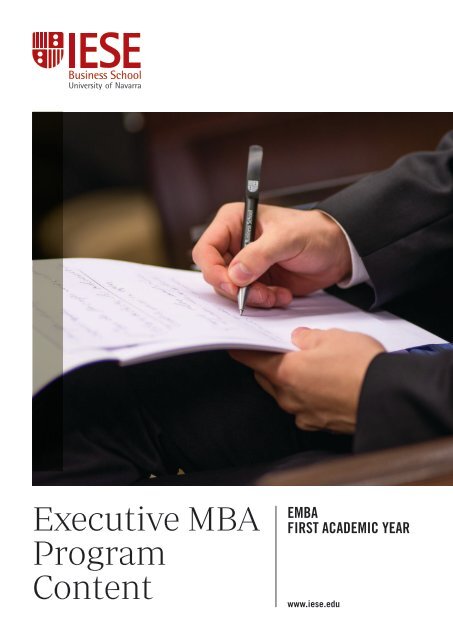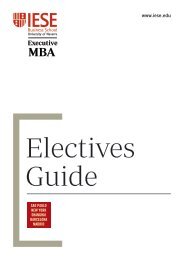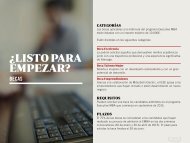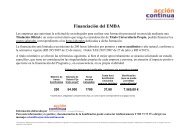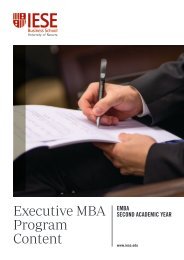EMBA FIRST ACADEMIC YEAR
You also want an ePaper? Increase the reach of your titles
YUMPU automatically turns print PDFs into web optimized ePapers that Google loves.
Executive MBA<br />
Program<br />
Content<br />
<strong>EMBA</strong><br />
<strong>FIRST</strong> <strong>ACADEMIC</strong> <strong>YEAR</strong><br />
www.iese.edu
EXECUTIVE MBA<br />
PROGRAM CONTENT<br />
<strong>FIRST</strong> <strong>ACADEMIC</strong> <strong>YEAR</strong><br />
<strong>FIRST</strong> TERM<br />
SEPTEMBER-DECEMBER<br />
• PRELIMINARY SUBJECT: FINANCIAL ACCOUNTING<br />
• FINANCIAL ACCOUNTING<br />
• ANALYSIS OF BUSINESS SITUATIONS<br />
• FUNDAMENTALS OF SALES MANAGEMENT<br />
• DECISION ANALYSIS<br />
THIRD TERM<br />
APRIL-JULY<br />
• MANAGING PEOPLE: HUMAN RESOURCES<br />
• CORPORATE FINANCE<br />
• ECONOMIC CONTEXT<br />
• ENTREPRENEURSHIP<br />
• COMPETITIVE STRATEGY<br />
• MANAGING PEOPLE IN ORGANIZATIONS<br />
SECOND TERM<br />
JANUARY-MARCH<br />
• FINANCIAL ANALYSIS<br />
• ECONOMIC DECISION ANALYSIS<br />
• OPERATIONS MANAGEMENT<br />
• IMPLEMENTING SALES<br />
• ETHICS
CONTENT <strong>FIRST</strong> <strong>ACADEMIC</strong> <strong>YEAR</strong><br />
<strong>FIRST</strong> TERM SEPTEMBER-DECEMBER<br />
Preliminary subject:<br />
Financial Accounting<br />
Objective of the subject: to introduce the fundamentals of<br />
accounting.<br />
• Students learn the fundamentals and mechanics of<br />
financial accountings in a simple, intuitive way.<br />
• It is aimed at participants who have had no exposure to<br />
financial accounting in their studies and/or professional<br />
activities.<br />
• This voluntary subject is taught before the official start of<br />
the first year of the Executive MBA.<br />
Financial Accounting<br />
Objective of the subject: to analyze and interpret the<br />
financial information contained in financial statements.<br />
• Students learn about the content and purpose of three<br />
financial statements: the balance sheet, the income<br />
statement and the cash flow statement.<br />
• They learn to draw up financial statements so they can<br />
understand and interpret them correctly.<br />
• They find out how to obtain information from financial<br />
statements and become familiar with the usefulness<br />
and limitations of this information for diagnosing and<br />
solving business problems.<br />
Analysis of Business Situations<br />
Objective of the subject: to develop the skills to reflect on<br />
complex, real-world business problems.<br />
• Students analyze the different phases in the process<br />
of making and implementing decisions: identifying the<br />
problem, establishing quantitative and qualitative criteria,<br />
proposing different solutions and making the decision.<br />
• The aim is to change the way students think about<br />
problems that require action.<br />
• The subject allows them to polish their analytical,<br />
synthesis and creative skills.<br />
IESE – UNIVERSITY OF NAVARRA • 5
CONTENT <strong>FIRST</strong> <strong>ACADEMIC</strong> <strong>YEAR</strong><br />
Fundamentals of Sales Management<br />
Decision Analysis<br />
Objective of the subject: to perform in-depth analysis of<br />
the fundamentals of marketing and sales strategy.<br />
• Students learn about product planning, market<br />
selection, distribution, setting prices and promotion<br />
to address management problems from a sales<br />
perspective.<br />
• They analyze the organization's sales tasks, including<br />
the functional responsibilities of sales managers and<br />
the other members of the management team.<br />
Objective of the subject: to learn to make decisions in<br />
situations of uncertainty and risk.<br />
• Students learn to structure decision-making problems in<br />
decision trees and to use the net current value concept<br />
to assess the decision's economic consequences when<br />
they are dispersed over time.<br />
• They are introduced to ways of measuring uncertainty<br />
using probability distributions.<br />
• They learn how to handle risk situations.<br />
• They acquire the skills, criteria and values they need<br />
to make prudent decisions.<br />
Managing People in Organizations<br />
Objective of the subject: to analyze the concepts of<br />
motivation, organization size, management styles<br />
and organizational behavior from an anthropological<br />
perspective.<br />
• Students analyze people's behavior in several different<br />
contexts within the organization.<br />
• They perform in-depth analysis of interfunctional<br />
relations, hierarchical communication and sources of<br />
authority.<br />
• They acquire people development and executive<br />
coaching skills.<br />
6 • EXECUTIVE MBA
CONTENT <strong>FIRST</strong> <strong>ACADEMIC</strong> <strong>YEAR</strong><br />
SECOND TERM JANUARY-MARCH<br />
Financial Analysis<br />
Objective of the subject: to become familiar with<br />
financial diagnosis and forecasts while stressing the<br />
importance of ensuring the company has sufficient<br />
cash flow.<br />
• Students learn the difference for shareholders between<br />
profit and cash flow.<br />
• They learn the difference between operating capital<br />
and working capital.<br />
• They use tools to analyze investments and determine<br />
the value of companies.<br />
Economic Decision Analysis<br />
Objective of the subject: to learn about the different uses of<br />
accounting and other information within the company.<br />
• Students practice calculation methods to determine the<br />
impact of operating decisions on the income statement.<br />
• They learn the different parts of the cost system<br />
structure.<br />
• They design cost systems so they can compare real and<br />
anticipated results.<br />
IESE – UNIVERSITY OF NAVARRA • 7
CONTENT <strong>FIRST</strong> <strong>ACADEMIC</strong> <strong>YEAR</strong><br />
Operations Management<br />
Implementing Sales<br />
Objective of the subject: to learn to find the best way<br />
to run the company, generate value for customers and<br />
ultimately gain a competitive edge.<br />
• Students acquire a global view of operations in services<br />
and industrial companies.<br />
• They explore the basic variables, concepts and tools to<br />
acquire a full understanding of the world of operations.<br />
• They learn the fundamentals of diagnosing and<br />
improving the different kinds of operations systems.<br />
Objective of the subject: to analyze sales management<br />
situations by considering the distribution of time and<br />
human and financial resources to put a product or service<br />
on the market.<br />
• Students learn the essential parts of a communication<br />
strategy: mission, market, messages, the media, budget<br />
and measuring.<br />
• They perform in-depth analysis of the sales process,<br />
policies and the supervision required to manage the<br />
sales staff.<br />
• They analyze the main options when putting a product<br />
or service on the market.<br />
Ethics<br />
Objective of the subject: to offer an overview of the<br />
responsibilities assumed by managers in the organizations<br />
they control, the teams they lead and their personal lives.<br />
• Students acquire the fundamentals required to ensure<br />
ethics forms part of the manager's job.<br />
• They increase their awareness about ethics and the<br />
moral dimension of business decisions.<br />
• They reflect on the meaning of managerial action and<br />
the role organizations play in society.<br />
8 • EXECUTIVE MBA
CONTENT <strong>FIRST</strong> <strong>ACADEMIC</strong> <strong>YEAR</strong><br />
THIRD TERM APRIL-JULY<br />
Managing People:<br />
Human Resources<br />
Objective of the subject: to lay the groundwork for<br />
decision making in the critical areas of labor relations and<br />
human resources management.<br />
• Students perform in-depth analysis of labor relations<br />
(union strategy, collective bargaining).<br />
• They analyze the function of human resources, how<br />
it relates to company strategy, and the system of<br />
personnel policies and practices.<br />
• They learn about human resources policies and<br />
practices (recruiting, assessment, development and<br />
compensation).<br />
Economic Context<br />
Objective of the subject: to describe the principles,<br />
concepts and models that help us understand the context<br />
in which companies operate and how economic policies<br />
can modify this context.<br />
• Students review the main microeconomic concepts.<br />
• They review the main macroeconomic concepts (except<br />
for those involving international economics, which are<br />
studied in Economics II in the second academic year).<br />
• They discuss the current economic situation and<br />
prospects for the immediate future.<br />
Corporate Finance<br />
Objective of the subject: to develop the skills required<br />
to work in corporate financial management with special<br />
emphasis on making long-term decisions.<br />
• Students examine companies' relationships with capital<br />
markets, debt markets and the stock market.<br />
• Managing a company's value is defined as the<br />
conceptual framework, and students carry out in-depth<br />
analysis of ways to generate value.<br />
• The coherence of companies' financial policies<br />
with their corporate strategy is established as the<br />
performance criterion.<br />
Entrepreneurship<br />
Objective of the subject: to promote a systemic view of<br />
creating new opportunities in widely different contexts.<br />
• Students explore entrepreneurial behavior, the nature of<br />
opportunities and the entrepreneurial process.<br />
• They are introduced to useful concepts and tools<br />
for designing, assessing and implementing new<br />
opportunities.<br />
• They look at managing teams of entrepreneurs,<br />
searching for capital and setting up a board of directors.<br />
IESE – UNIVERSITY OF NAVARRA • 9
CONTENT <strong>FIRST</strong> <strong>ACADEMIC</strong> <strong>YEAR</strong><br />
Competitive Strategy<br />
Objective of the subject: to help students think<br />
strategically in different business situations.<br />
• Students are introduced to a coherent conceptual<br />
framework on creating and capturing value.<br />
• They learn about concepts to analyze the company's<br />
competitive environment and its internal reality.<br />
• They learn to formulate a business strategy that will<br />
shape the company's future environment and help in<br />
future company decision making.<br />
10 • EXECUTIVE MBA
IESE – UNIVERSITY OF NAVARRA • 11
CONTENT <strong>FIRST</strong> <strong>ACADEMIC</strong> <strong>YEAR</strong><br />
www.iese.edu<br />
IESE Business School<br />
iesebs<br />
IESE Business School<br />
iese<br />
Madrid<br />
Camino del Cerro<br />
del Águila, 3<br />
28023 Madrid, Spain<br />
+34 91 211 30 00<br />
12 • EXECUTIVE MBA<br />
Barcelona<br />
Av. Pearson, 21<br />
08034 Barcelona, Spain<br />
+34 93 253 42 00<br />
New York<br />
165 W. 57th Street<br />
New York, NY 10019-2201<br />
USA<br />
+1 646 346 8850<br />
Munich<br />
Maria-Theresia-Straße 15<br />
81675 Munich, Germany<br />
+49 89 24 20 97 90<br />
Sao Paulo<br />
Rua Martiniano de Carvalho,<br />
573 Bela Vista<br />
01321001 Sao Paulo, Brazil<br />
+55 11 3177 8221


